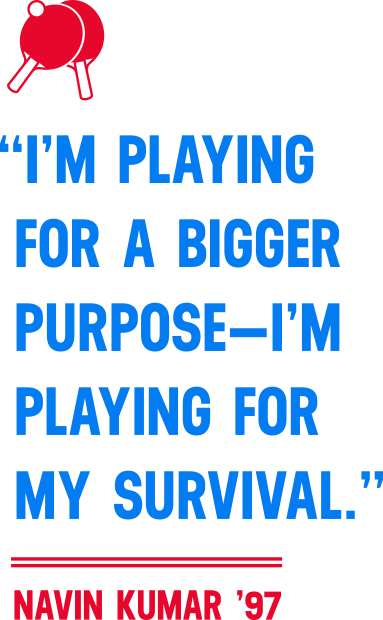- July 07, 2015
- By Karen Shih ’09
To most of us, table tennis is more of a game than a sweaty athletic endeavor, something you play on cruise ships and in basements. But for Navin Kumar ’97, table tennis is a lifeline.
“It’s not about winning or losing,” he says. “I’m playing for a bigger purpose—I’m playing for my survival.”
Kumar has a mechanical heart, just one result of his five surgeries, as well as Parkinson’s disease, so he needs to stay active. The swift movements and concentration needed for table tennis have helped him combat muscle stiffness, add flexibility and sharpen his reflexes, all while improving his overall fitness.
This week, “the Bionic Man,” as Kumar is known in the table tennis world, is competing at the U.S. Open in Las Vegas. Just two weeks ago, he upset a Norwegian player to win his first international match, in Barcelona, at one of the Paralympic tune-up events, earning him a world ranking for the first time. His goal: Qualify for the U.S. team that goes to the Paralympics next year in Rio de Janeiro (right after the 2016 Summer Olympics)—though with just a year of competitive experience under his belt, the 2020 Tokyo games might be more realistic.
Born with Shone’s syndrome, a rare congenital heart disease, Kumar had his first two open-heart surgeries at age 3. His parents flew him from their home in Utah to Houston, so he could be under the care of one of the nation’s top surgeons. The surgeries punctuated his life, including interrupting his freshman year of college, resulting in his now-mechanical heart, which functions with an artificial aorta and a pacemaker.
“My whole life has been about defying the odds,” says Kumar, who had his last procedure in 2001. “Now I’ve dedicated my life to inspiring people to keep their hearts healthy and fight Parkinson’s, both through playing table tennis.”
The muscle stiffness and tremors affect everyday things that “able-bodied people take for granted,” he says. It’s difficult for him to put on pants, socks and shoes, he can never sit on the floor, and his handwriting has become bunched up and small because the tremors affect his dominant hand.
Despite those challenges, he’s the first athlete with the nervous-system disorder in history to compete at the Paralympic level for any sport.
“When I was young, I was physically restricted from playing most sports, so table tennis was the perfect thing for me to learn, with minimal physical impact,” he says. His father started teaching him when he was 4 years old, and over the years, he played recreationally on and off, even winning a cruise ship doubles tournament with his brother-in-law five years ago.
Last summer, inspired by the 2014 movie “Ping Pong Summer,” he took the sport up again and quickly got serious. He’s coached by Larry Hodges ’86, M.Jour. ’97, a member of the USA Table Tennis Hall of Fame who helped open the Maryland Table Tennis Center in Gaithersburg, where Kumar and many top competitors train.
“He’s improved dramatically. A year ago, he could barely hit forehands,” Hodges says. “Now, once you get past the top couple of players, he has a chance against anyone.”
Kumar practices six days a week, going from his job as an IT specialist at the U.S. Department of Health and Human Services to the gym, then home to spend time with his wife and two daughters, ages 5 and 10.
“It’s the difficult times in life and how you choose to deal with them that define and shape you,” says Kumar, who not only battles the tremors of Parkinson’s, which occur when he’s still—including when he’s about the serve the ball—but also side effects like internal bleeding, that result from the blood thinner he must take to help his mechanical heart function. “One thing after the next, I’ve had to deal with life knocking me down, but the true joy in life for me is to pick myself back up with a smile and keep fighting the fight.”
 “Parkinson’s has been a blessing for me because I get to represent my country and inspire people with and without Parkinson’s worldwide,” he says. “I want people to know it’s okay to be different. It’s a gift.”
“Parkinson’s has been a blessing for me because I get to represent my country and inspire people with and without Parkinson’s worldwide,” he says. “I want people to know it’s okay to be different. It’s a gift.”
